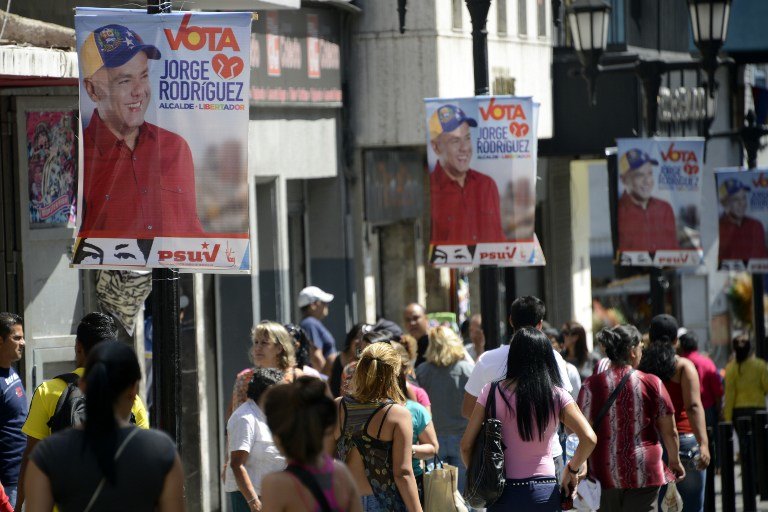SUMMARY
This is AI generated summarization, which may have errors. For context, always refer to the full article.

CARACAS, Venezuela – Venezuela votes Sunday, December 8, in municipal elections seen as a referendum on the performance of President Nicolas Maduro, his standing buffeted by high inflation and frequent shortages since being elected by a narrow majority in April.
The handpicked successor of Hugo Chavez, who died of cancer in March, has presented himself in recent months as a man of action in the face of a teetering economy in a country with the world’s largest oil reserves.
On November 20, the National Assembly gave Maduro powers to rule by decree to fight corruption and to respond to what he charges is an “economic war” unleashed by the opposition with US backing.
Maduro, who styles himself as the “avenging president,” immediately rolled out a series of measures to force cuts in prices, notably household appliances and automobiles, and threaten speculators with prison.
With several days to go before the election, private polls indicate that Maduro’s display of willfulness and the populist tenor of the measures have been well received by the middle class, which appears less inclined than expected to punish his party at the ballot box.
“Maduro appears to be governing for the first time (since the election),” pollster Luis Vicente Leon told Agence France-Presse.
“Now his speeches are accompanied by action, so he is seen as president who, whether you like what he’s doing or not, has taken the bull by the horns.”
At a time when the country is experiencing a record 54% inflation since January and confronts shortages of basic necessities, and an explosion in the black market value of the dollar, “a crazy paradox occurs: the one who is benefiting from the crisis is Maduro,” Leon said.
In effect, said fellow pollster Miguel Velarde of the Alpha Politikos Institute, recent developments in the economic arena “have strengthened confidence in the political leadership.”
‘Historic moment’ for the opposition
For the Democratic Unity Table, or MUD, the main opposition coalition, the elections in 337 municipalities across the country will be decisive for its future.
Its leader Henrique Capriles, who lost to Maduro in April by only 1.5% of the vote, has called it a “historic moment” that will assess the balance of forces after 14 years of “Chavista” rule.
“We must be disciplined with our sentiment for change and express it forcefully,” the Miranda state governor said Wednesday in one of the last opposition campaign rallies before the elections.
The opposition, which now controls about 50 municipalities, would be satisfied if they were able to double that number, even if it means leaving the ruling United Socialist Party entrenched in 230 other municipalities.
Its greatest challenge, however, will be to maintain control of the country’s biggest cities, and especially the Caracas metropolitan area, a “super mayoralty” composed of five municipalities, and the oil city of Maracaibo.
While opposition leader Antonio Ledezma is expected to win reelection in Caracas against former communications minister Ernesto Villegas, forecasts are less optimistic for the opposition in Maracaibo.
Incumbent Mayor Eveling Trejo, whose performance in the country’s second-largest city has been faulted, appears in a weak position against socialist candidate Miguel Perez Pirela, a 36-year-old Francophile philosopher whose appearances on state television have made him a celebrity.
The ruling party has also plugged its candidates with endorsements by local celebrities, like former Major League baseball players Magglio Ordonez and Antonio “El Potro” Alvarez, and the former reality show host Winston Vallenillas.
Despite the intense campaign it has waged over the past weeks, however, the government has refused to acknowledge that the outcome will be a “referendum” on its performance, especially since the powers of municipal officials are very limited in Venezuela. – Rappler.com
Add a comment
How does this make you feel?
There are no comments yet. Add your comment to start the conversation.